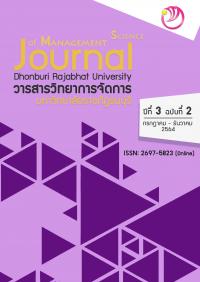การพัฒนาสมรรถนะผู้นำเพื่อส่งเสริมการท่องเที่ยวอัจฉริยะ
คำสำคัญ:
การท่องเที่ยวอัจฉริยะ, สมรรถนะนะผู้นำ, การพัฒนาสมรรถนะบทคัดย่อ
การพัฒนาการท่องเที่ยวอัจฉริยะต้องอาศัยผู้นำที่มีสมรรถนะที่เหมาะสม เพื่อที่จะสร้างการมีส่วนร่วมจากชุมชน การดำเนินงานร่วมกับภาคีเครือข่ายต่างๆ รวมทั้งขับเคลื่อนกิจกรรมเพื่อส่งเสริมการท่องเที่ยว บทความนี้ได้ทบทวนแนวคิดเกี่ยวกับการท่องเที่ยวอัจฉริยะ สมรรถนะผู้นำเพื่อส่งเสริมการท่องเที่ยวอัจฉริยะ และนำเสนอแนวทางการพัฒนาสมรรถนะผู้นำเพื่อส่งเสริมการท่องเที่ยวอัจฉริยะ ซึ่งการพัฒนาการท่องเที่ยวอัจฉริยะให้ประสบความสำเร็จจึงต้องอาศัยการพัฒนาให้ผู้นำมีสมรรถนะให้มีสมรรถนะเชิงโอกาส สมรรถนะเชิงความสัมพันธ์ สมรรถนะเชิงความคิดรวบยอด สมรรถนะการจัดการ สมรรถนะเชิงกลยุทธ์ สมรรถนะเชิงความ และสมรรถนะเชิงสนับสนุน โดยการพัฒนาสมรรถนะผู้นำนั้นควรใช้แนวทางของการพัฒนาทรัพยากรมนุษย์ที่หลากหลาย มุ่งเน้นการทำให้ผู้นำชุมชนท่องเที่ยวสามารถขับเคลื่อนกิจกรรมต่างๆ โดยอาศัยเทคโนโลยีสารสนเทศเข้ามาใช้ในการดำเนินงานด้านการท่องเที่ยว
เอกสารอ้างอิง
ชญาพัฒน์ เลิศอำนาจกิจเสรี. (2563). การศึกษาตัวแบบการจัดการวิสาหกิจชุมชนการท่องเที่ยวเชิงนิเวศอย่างยั่งยืนในภาคเหนือตอนบน. วารสารการจัดการภาครัฐและภาคเอกชน, 27(2), 47-63.
ณภัทร ญาโนภาส. (2561). นวัตกรรมการท่องเที่ยวยุคดิจิทัล. วารสารวิชาการ มหาวิทยาลัยราชภัฏกาญจนบุรี, 7(2), 148-157.
นิสดารก์ เวชยานนท์. (2559). Competency- based approach (พิมพ์ครั้งที่ 7). นนทบุรี: เดอะกราฟิโก ซิสเต็มส์.
บุญเลิศ จิตตั้งวัฒนา และเพ็ญศิริ ศรีคำภา. (2557). การพัฒนาการท่องเที่ยวแบบยั่งยืน (พิมพ์ครั้งที่ 2). นนทบุรี: ธรรมสาร.
ผกามาศ ชัยรัตน์, ประภาศรี พรหมประกาย, ศรีสุดา จงสิทธิผล และณัฏฐพัชร มณีโรจน์. (2563). การพัฒนาการใช้เทคโนโลยีสารสนเทศและการสื่อสาร (ICT) เสริมทักษะการเรียนรู้ของชุมชนเพื่อประชาสัมพันธ์สถานที่ท่องเที่ยวโดยชุมชน เขตบางกอกน้อย กรุงเทพมหานคร. วารสารบัณฑิตศึกษา: มหาวิทยาลัยราชภัฏสวนสุนันทา, 13(1), 1-17.
พิมพ์ระวี โรจน์รุ่งสัตย์. (2553). การท่องเที่ยวชุมชน. กรุงเทพฯ: โอ. เอส. พริ้นติ้ง เฮ้าส์.
เพชรศรี นนท์ศิริ. (2555). รูปแบบการดำเนินงานของกลุ่มท่องเที่ยวโดยชุมชนในเขตภาคเหนือตอนล่าง. วารสารวิชาการการท่องเที่ยวไทยนานาชาติ, 8(2), 47-65.
มธุรา สวนศรี. (2559). แนวทางการพัฒนาการพัฒนาและส่งเสริมการท่องเที่ยวเพื่อสะท้อนอัตลักษณ์ตลาดน้ำบางน้ำผึ้ง จังหวัดสมุทรปราการ. กระแสวัฒนธรรม, 17(31), 41-55.
สุธีญา พรหมมาก. (2554). ภาวะผู้นำกับการส่งเสริมการมีส่วนร่วมของประชาชนในการพัฒนาด้านการท่องเที่ยวขององค์การบริหารส่วนตำบลเขาชัยสน จังหวัดพัทลุง. วารสารวิทยบริการ, 22(3), 30-43.
Aguinis, H. (2013). Performance management (3rd ed.). Boston: Pearson Education.
Armstrong, M. (2016). Armstrong’s handbook of strategic human resource management (6th ed.). Philadelphia: Kogen Page.
Boes, K., Buhalis, D., & Inversini, A. (2015). Conceptualising smart tourism destination dimensions. In I. Tussyadiah & A. Inversini (eds.), Information and communication technologies in tourisms (pp. 391-403). London: Springer International Publishing.
Dubois, D. D. (2004). Competency- based human resource management. Palo Alto, Calif: Davies-Black pub.
Gretzel, U., Sigala, M., Xiang, Z., Koo, C. (2015). Smart tourism: Foundations and developments. Electron Markets, 25, 179-188.
Kontogeorgopoulos, N., Churyen, A., & Duangsaeng, V. (2014). Success factors in community-based tourism in Thailand: The role of luck, external support, and local leadership. Tourism Planning & Development, 11(1), 106-24.
Lee, P., Hunter, W. C., & Chung, N. (2020). Smart tourism city: Development and transformations. Sustainability, 12, 3958; doi:10.3390/su12103958.
Man, T. W., & Lau, T. (2000). Entrepreneurial competencies of SME owner/managers in Hong Kong service sector: A qualitative analysis. Journal of Enterprising Culture, 8(3), 235-254.
Man, T. W., Lau, T., & Snape, E. (2008). Entrepreneurial competencies and the performance of small and medium enterprises: An investigation through a framework of competitiveness. Journal of Small Business & Entrepreneurship, 21(3), 257-276.
Nadler, L. (1990). The handbook of human resource development (2nd ed.). New York: Wiley.
Rahman, S. A., Ahmad, N. H., & Taghizadeh, S. K. (2016). Entrepreneurial competencies of BoP entrepreneurs in Bangladesh to achieve business success. Journal of General Management, 42(1), 45-63.
Sawatsuk, B., Darmawijaya, I, Ratchusanit, S., & Phaokrueng, A. (2018). Factors determining the sustainable success of community-based tourism: Evidence of good corporate governance of Mae Kam Pong homestay, Thailand. International Journal of Business and Economic Affairs (IJBEA), 3(1), 13-20.
Shermon, G. (2004). Competency- based HRM: a strategic resource for competency mapping, assessment and development centres. New Delhi: Tata McGraw-Hill.
Spencer, L. M., & Spencer, S. M. (1993). Competence at work: Models for superior performance. New York: John Wiley & Sons.
Sturma, R. E., Vera, D., & Crossan, M. (2017). The entanglement of leader character and leader competence and its impact on performance. The Leadership Quarterly, 28, 349-366.
Swanson, R. A., & Holton III, E. F. (2009). Foundations of human resource development (2nd ed.). San Francisco, CA : Berrett-Kohler.
Tosun, C., & Timothy, D. (2003). Arguments for community participation in the tourism development process. Journal of Tourism Studies, 14(2), 2-14.
Wonga, C. Y., Boon-ittb, S., & Wongc, C. W. Y. (2011). The contingency effects of environmental uncertainty on the relationship between supply chain integration and operational performance. Journal of Operations Management, 29(6), 604-615.
ดาวน์โหลด
เผยแพร่แล้ว
รูปแบบการอ้างอิง
ฉบับ
ประเภทบทความ
สัญญาอนุญาต

อนุญาตภายใต้เงื่อนไข Creative Commons Attribution-NonCommercial-NoDerivatives 4.0 International License.







